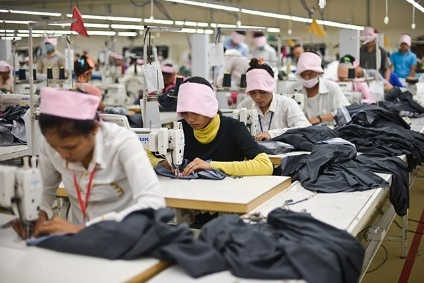
Better Factories Cambodia (BFC) says its programme is showing real results in the working conditions of garment workers but admits there is more work to be done in relation to gender differences in areas such as wages and harassment.
The BFC, which is a partnership between the UN’s International Labour Organization (ILO) and the International Finance Corporation (IFC), engages with employers’ and workers’ organisations, government partners, and international apparel brands to pursue dual objectives of improving working conditions and firm competitiveness. It was recently extended for a further three years.
“Results show that factories receiving the full package of BFC services achieve improvements in compliance systematically above the industry average,” says Sara Park, Better Factories Cambodia programme manager. “This is a strong indication that commitment to improving working conditions, through an integrated approach of greater compliance enforcement, training, and advisory services, are key determinants of both business success and the well-being of workers.”
In a study detailing results of the programme: ‘Harnessing Compliance to Improve Well-being and Productivity: The Impact of Better Factories Cambodia’, shows that being a part of BFC leads to a decrease in long hours of work that are typical in the apparel sector – on average, a reduction in overtime of 5.8 hours per week (or 8.8%) as factories achieve compliance with working time regulation.
At the same time, workers maintain or increase their weekly take-home pay, which researchers attribute to increased compliance with pay regulations, including as minimum wages were rising in the sector. The effective pay per hour for workers in the study rises 41%, all else being equal.
Factory productivity also increases. Efficiency rates, as measured by workers’ reported time to achieve their daily and hourly production target, increases by approximately 20% compared to firms which had not yet fully participated in the BFC programme. Factories simultaneously increase their production targets and planned production. Taking the two trends together, researchers estimate an average cumulative productivity improvement between 26-31%.

US Tariffs are shifting - will you react or anticipate?
Don’t let policy changes catch you off guard. Stay proactive with real-time data and expert analysis.
By GlobalDataWorkplaces participating in the BFC programme have also found to become more respectful. Workers’ reported exposure to behaviours constituting sexual harassment falls over time.
Still, only less than half of the workers surveyed believe that an adequate reporting system for sexual harassment exists in their factory, suggesting that grievance procedures and anti-harassment training still have significant room for improvement.
“The main channel by which Better Factories Cambodia reduces sexual harassment is through improvements in power relationships determined by misaligned pay incentive structures between workers and supervisors,” Park says. “Sexual harassment is found to be most common in factories where workers are paid based on their productivity, or “by the piece,” and supervisors are paid a fixed salary.”
Female and male workers’ survey responses stress a widely shared concern about low wages, identified as the main cause of extra working. But while women struggle in combining overtime demands in the factory with household pressures, men are more likely than women to report that they cannot refuse overtime amid fears of being terminated.
Finally, the implementation of occupational safety and health standards (OSH) remains a major challenge across the local garment industry, a situation also mirrored in other garment-producing countries around the world. Men tend to report OSH concerns more frequently than women, as they are also more likely to be employed in high-risk operations in the factory.
“Survey responses point to the need to strengthen training on worker rights for especially female garment workers,” Park says. “It is also crucial we jointly scale up efforts for the eradication of harassment and discrimination alongside further action to improve OSH standards and workers’ job and life satisfaction.”
Better Factories Cambodia believes increased action aimed to tackle gender differences in contracts, training and promotions, overtime, wages, harassment and violence at work is key to challenge the status quo, eventually leading women to become more vocal about the challenges they face daily in their professional and personal life.




